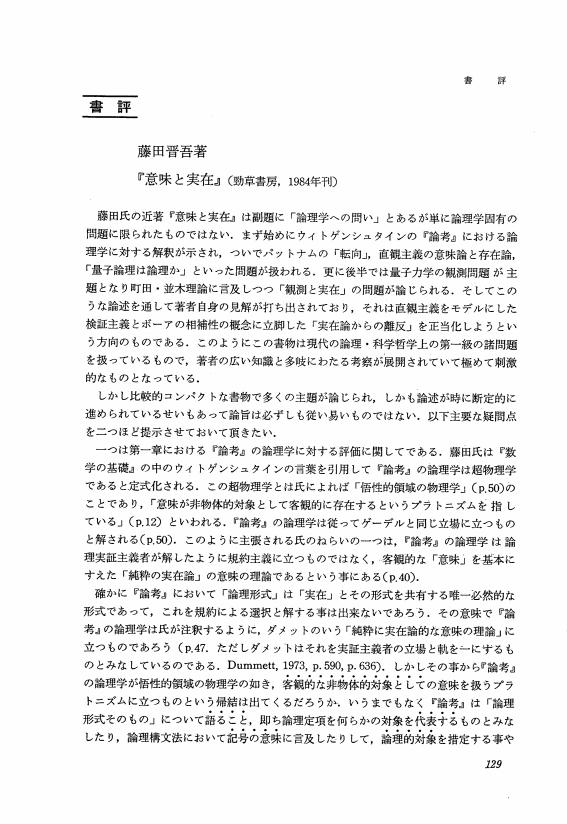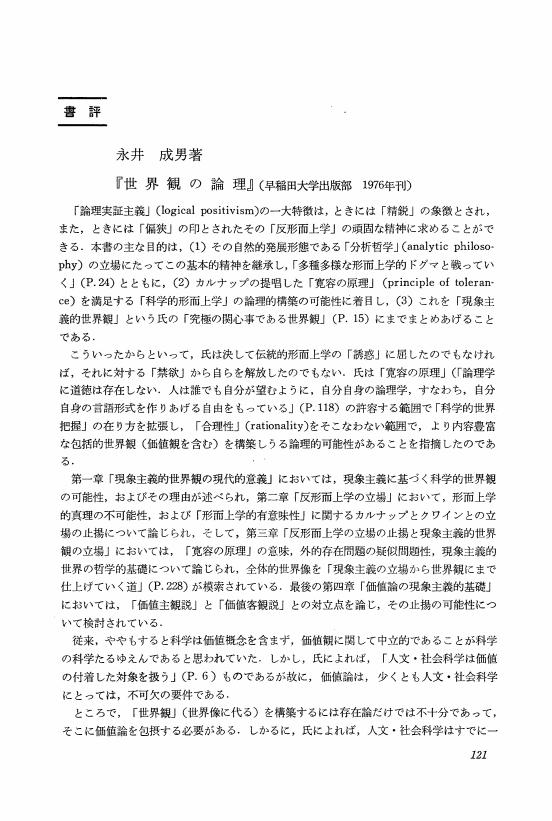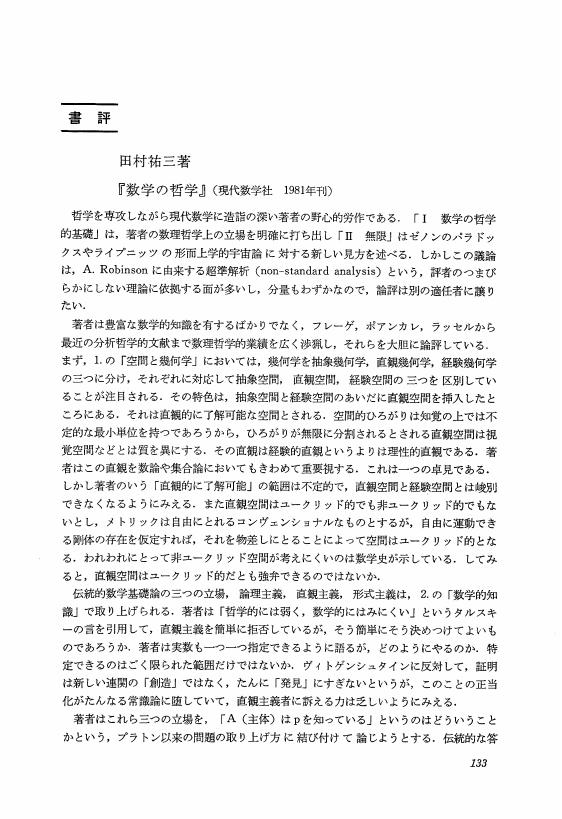1 0 0 0 OA 書評
- 著者
- 竹尾 治一郎他
- 出版者
- 日本科学哲学会
- 雑誌
- 科学哲学 (ISSN:02893428)
- 巻号頁・発行日
- vol.23, pp.107-115, 1990-11-10 (Released:2009-05-29)
1 0 0 0 OA 書評
- 著者
- 瀬在 良男他
- 出版者
- 日本科学哲学会
- 雑誌
- 科学哲学 (ISSN:02893428)
- 巻号頁・発行日
- vol.24, pp.113-122, 1991-11-15 (Released:2009-05-29)
1 0 0 0 OA 書評
- 著者
- 碧海 純一他
- 出版者
- 日本科学哲学会
- 雑誌
- 科学哲学 (ISSN:02893428)
- 巻号頁・発行日
- vol.25, pp.142-153, 1992-11-14 (Released:2009-05-29)
1 0 0 0 OA 書評
- 著者
- 竹尾 治一郎他
- 出版者
- 日本科学哲学会
- 雑誌
- 科学哲学 (ISSN:02893428)
- 巻号頁・発行日
- vol.17, pp.149-162, 1984-11-24 (Released:2009-05-29)
- 被引用文献数
- 1
1 0 0 0 OA 書評
- 著者
- 山田 友幸他
- 出版者
- 日本科学哲学会
- 雑誌
- 科学哲学 (ISSN:02893428)
- 巻号頁・発行日
- vol.18, pp.129-132, 1985-11-15 (Released:2009-05-29)
1 0 0 0 OA 書評
- 著者
- 小林 道夫他
- 出版者
- 日本科学哲学会
- 雑誌
- 科学哲学 (ISSN:02893428)
- 巻号頁・発行日
- vol.19, pp.129-136, 1986-11-20 (Released:2009-05-29)
1 0 0 0 OA 書評
- 著者
- 沢田 允茂他
- 出版者
- 日本科学哲学会
- 雑誌
- 科学哲学 (ISSN:02893428)
- 巻号頁・発行日
- vol.20, pp.125-128, 1987-11-05 (Released:2009-05-29)
1 0 0 0 OA 書評
- 著者
- 奥 雅博他
- 出版者
- 日本科学哲学会
- 雑誌
- 科学哲学 (ISSN:02893428)
- 巻号頁・発行日
- vol.21, pp.161-165, 1988-11-05 (Released:2009-05-29)
1 0 0 0 OA 書評
- 著者
- 土屋 俊他
- 出版者
- 日本科学哲学会
- 雑誌
- 科学哲学 (ISSN:02893428)
- 巻号頁・発行日
- vol.22, pp.111-114, 1989-11-10 (Released:2009-05-29)
1 0 0 0 OA 書評
1 0 0 0 OA 書評
- 著者
- 石本 新他
- 出版者
- 日本科学哲学会
- 雑誌
- 科学哲学 (ISSN:02893428)
- 巻号頁・発行日
- vol.14, pp.125-132, 1981-11-10 (Released:2009-05-29)
1 0 0 0 OA 書評
- 著者
- 市井 三郎他
- 出版者
- 日本科学哲学会
- 雑誌
- 科学哲学 (ISSN:02893428)
- 巻号頁・発行日
- vol.15, pp.141-149, 1982-11-13 (Released:2009-05-29)
1 0 0 0 OA 書評
- 著者
- 中村 秀吉他
- 出版者
- 日本科学哲学会
- 雑誌
- 科学哲学 (ISSN:02893428)
- 巻号頁・発行日
- vol.16, pp.133-142, 1983-11-26 (Released:2009-05-29)
1 0 0 0 OA 書評
- 著者
- 藤川 吉美
- 出版者
- 日本科学哲学会
- 雑誌
- 科学哲学 (ISSN:02893428)
- 巻号頁・発行日
- vol.11, pp.139-140, 1978-10-20 (Released:2009-05-29)
1 0 0 0 OA 追悼記事
- 著者
- 三浦 俊彦
- 出版者
- The Philosophy of Science Society, Japan
- 雑誌
- 科学哲学 (ISSN:02893428)
- 巻号頁・発行日
- vol.46, no.1, pp.77, 2012 (Released:2016-01-13)
1 0 0 0 量子力学的観測と物理的実在
- 著者
- 並木 美喜雄
- 出版者
- 日本科学哲学会
- 雑誌
- 科学哲学 (ISSN:02893428)
- 巻号頁・発行日
- no.27, pp.1-16, 1994
1 0 0 0 自己欺瞞のパラドクスと自己概念の多面性
- 著者
- 金杉 武司
- 出版者
- 日本科学哲学会
- 雑誌
- 科学哲学 (ISSN:02893428)
- 巻号頁・発行日
- vol.45, no.2, pp.47-63, 2012
Self-deception has traditionally been conceived as a phenomenon in which one is motivated by a desire that P to deceive oneself intentionally to form a belief that P despite his/her possession of a belief that not P. It has been argued, however, that this traditional conception is confronted with two paradoxes precisely because it construes self-deception in such a manner. Consequently, in recent years, an increasing number of philosophers have come to abandon the traditional conception of self-deception to deny that a self-deceiving subject owns a belief that not P and/or that self-deception is intentional. Against this backdrop, this paper argues that some of phenomena called "self-deception" should nonetheless be conceived under the traditional framework and, further, explores a possibility for avoiding the paradoxes under the traditional conception.
- 著者
- 古田 徹也
- 出版者
- 日本科学哲学会
- 雑誌
- 科学哲学 (ISSN:02893428)
- 巻号頁・発行日
- vol.47, no.1, pp.53-66, 2014
This review concerns Professor Hitoshi Nagai's recent book, <i>Wittgenstein no Goshin (Wittgenstein's Misdiagnosis)</i>. In this book, Professor Nagai makes his understanding of the latter part of Wittgenstein's "Blue Book". He argues that Wittgenstein set up an epoch-making solipsism, which Professor Nagai calls "Wittgenstein's solipsism" or "linguistic solipsism", but he adds that Wittgenstein himself misunderstood the meaning and significance of this solipsism. In this review, I consider the validity of Professor Nagai's arguments.
- 著者
- 鈴木 貴之
- 出版者
- 日本科学哲学会
- 雑誌
- 科学哲学 (ISSN:02893428)
- 巻号頁・発行日
- vol.40, no.2, pp.93-96, 2007
1 0 0 0 深層学習の哲学的意義
- 著者
- 鈴木 貴之
- 出版者
- 日本科学哲学会
- 雑誌
- 科学哲学 (ISSN:02893428)
- 巻号頁・発行日
- vol.53, no.2, pp.151-167, 2021
<p> Artificial intelligence research has made impressive progress in the last ten years with the development of new methodologies such as deep learning. There are several implications of the progress both for philosophy of cognitive science and philosophy of artificial intelligence, but none are conclusive. Though its success seems to support connectionism in cognitive science, there are several features of human cognition that remain to be explained. Also, though it is often said that deep learning is the key to build artificial general intelligence, deep neural networks we now have are specialized ones and it's not clear how we can build a general artificial intelligence from such specialized networks.</p>














